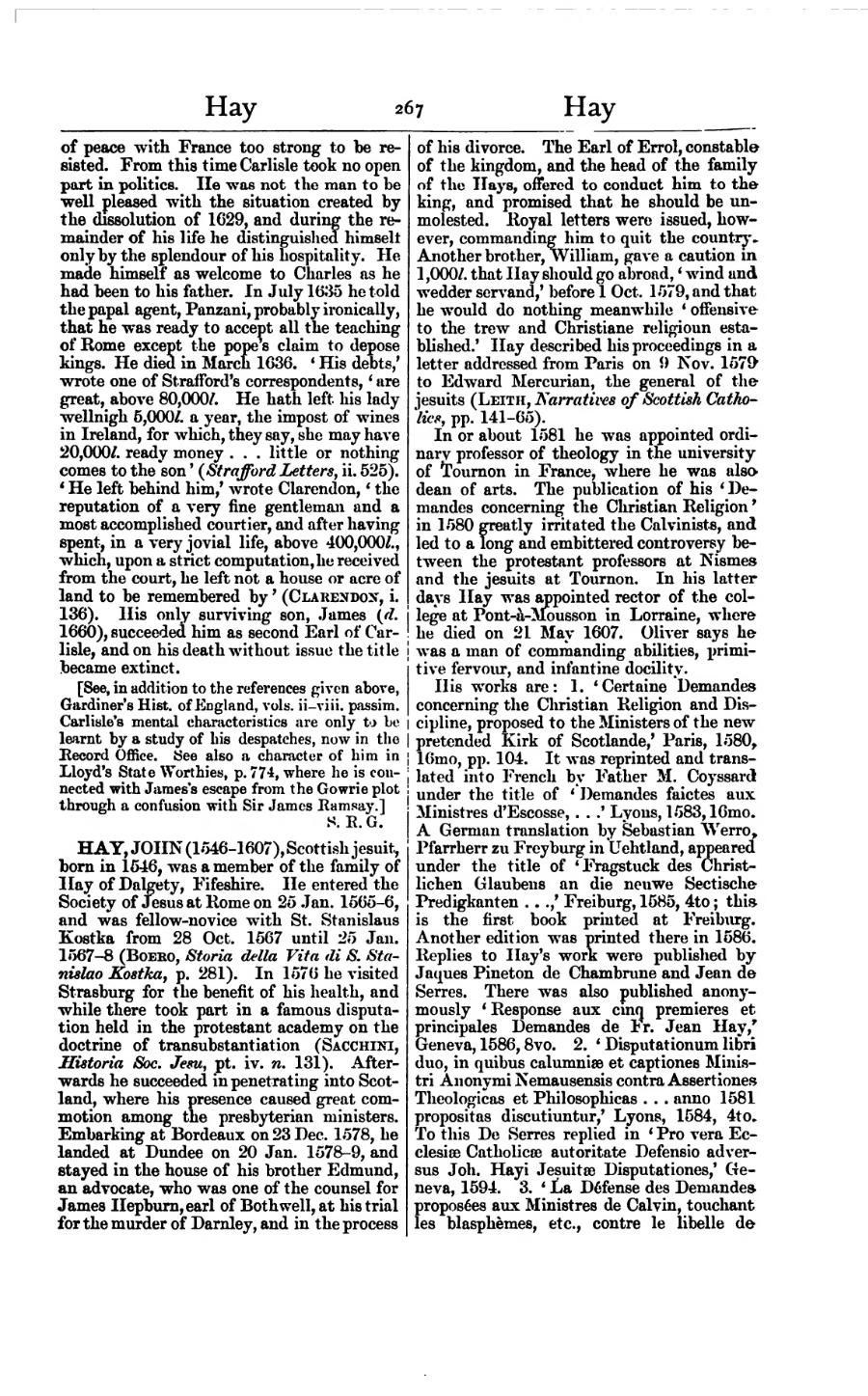of peace with France too strong to be resisted. From this time Carlisle took no open part in politics. He was not the man to be well pleased with the situation created by the dissolution of 1629, and during the remainder of his life he distinguished himself only by the splendour of his hospitality. He made himself as welcome to Charles as he had been to his father. In July 1635 he told the papal agent, Panzani, probably ironically, that he was ready to accept all the teaching of Rome except the pope's claim to depose kings. He died in March 1636. ‘His debts,’ wrote one of Strafford's correspondents, ‘are great, above 80,000l. He hath left his lady wellnigh 5,000l. a year, the impost of wines in Ireland, for which, they say, she may have 20,000l. ready money … little or nothing comes to the son’ (Strafford Letters, i. 525). ‘He left behind him,’ wrote Clarendon, ‘the reputation of a very fine gentleman and a most accomplished courtier, and after having spent, in a very jovial life, above 400,000l., which, upon a strict computation, he received from the crown, he left not a house or acre of land to be remembered by’ (Clarendon, i. 136). His only surviving son, James (d. 1660), succeeded him as second Earl of Carlisle, and on his death without issue the title became extinct.
[See, in addition to the references given above, Gardiner's Hist. of England, vols. ii–viii. passim. Carlisle's mental characteristics are only to be learnt by a study of his despatches, now in the Record Office. See also a character of him in Lloyd's State Worthies, p. 774, where he is connected with James's escape from the Gowrie plot through a confusion with Sir James Ramsay.]
HAY, JOHN (1546–1607), Scottish jesuit, born in 1546, was a member of the family of Hay of Dalgety, Fifeshire. He entered the Society of Jesus at Rome on 25 Jan. 1565–6, and was fellow-novice with St. Stanislaus Kostka from 28 Oct. 1567 until 25 Jan. 1567–8 (Boero, Storia della Vita di S. Stanislao Kostka, p. 281). In 1576 he visited Strasburg for the benefit of his health, and while there took part in a famous disputation held in the protestant academy on the doctrine of transubstantiation (Sacchini, Historia Soc. Jesu, pt. iv. n. 131). Afterwards he succeeded in penetrating into Scotland, where his presence caused great commotion among the presbyterian ministers. Embarking at Bordeaux on 23 Dec. 1578, he landed at Dundee on 20 Jan. 1578–9, and stayed in the house of his brother Edmund, an advocate, who was one of the counsel for James Hepburn, earl of Bothwell, at his trial for the murder of Darnley, and in the process of his divorce. The Earl of Errol, constable of the kingdom, and the head of the family of the Hays, offered to conduct him to the king, and promised that he should be unmolested. Royal letters were issued, however, commanding him to quit the country. Another brother, William, gave a caution in 1,000l. that Hay should go abroad, ‘wind and wedder servand,’ before 1 Oct. 1579, and that he would do nothing meanwhile ‘offensive to the trew and Christiane religioun established.’ Hay described his proceedings in a letter addressed from Paris on 9 Nov. 1579 to Edward Mercurian, the general of the jesuits (Leith, Narratives of Scottish Catholics, pp. 141–65).
In or about 1581 he was appointed ordinary professor of theology in the university of Tournon in France, where he was also dean of arts. The publication of his ‘Demandes concerning the Christian Religion’ in 1580 greatly irritated the Calvinists, and led to a long and embittered controversy between the protestant professors at Nismes and the jesuits at Tournon. In his latter days Hay was appointed rector of the college at Pont-à-Mousson in Lorraine, where he died on 21 May 1607. Oliver says he was a man of commanding abilities, primitive fervour, and infantine docility. His works are: 1. ‘Certaine Demandes concerning the Christian Religion and Discipline, proposed to the Ministers of the new pretended Kirk of Scotlande,’ Paris, 1580, 16mo, pp. 104. It was reprinted and translated into French by Father M. Coyssard under the title of ‘Demandes faictes aux Ministres d'Escosse, …’ Lyons, 1583, 16mo. A German translation by Sebastian Werro, Pfarrherr zu Freyburg in Uehtland, appeared under the title of ‘Fragstuck des Christlichen Glaubens an die neuwe Sectische Predigkanten …,’ Freiburg, 1585, 4to; this is the first book printed at Freiburg. Another edition was printed there in 1586. Replies to Hay's work were published by Jaques Pineton de Chambrune and Jean de Serres. There was also published anonymously ‘Response aux cinq premieres et principales Demandes de Fr. Jean Hay,’ Geneva, 1586, 8vo. 2. ‘Disputationum libri duo, in quibus calumniæ et captiones Ministri Anonymi Nemausensis contra Assertiones Theologicas et Philosophicas … anno 1581 propositas discutiuntur,’ Lyons, 1584, 4to. To this De Serres replied in ‘Pro vera Ecclesiæ Catholicæ autoritate Defensio adversus Joh. Hayi Jesuitæ Disputationes,’ Geneva, 1594. 3. ‘La Défense des Demandes proposées aux Ministres de Calvin, touchant les blasphèmes, etc., contre le libelle de
